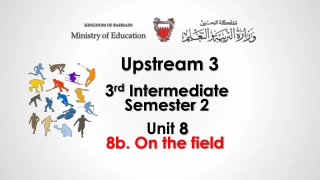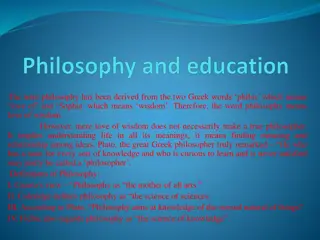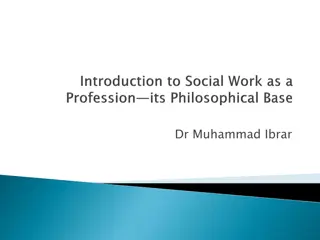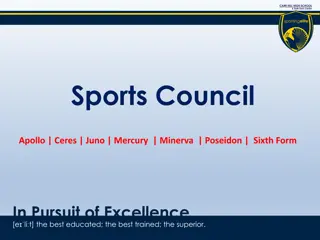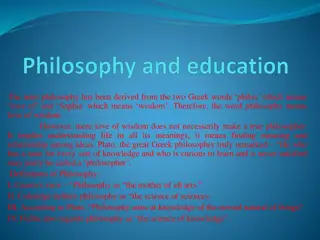Understanding Leadership and Philosophy in Sports
A well-developed philosophy can guide leaders in making difficult decisions and coaching successfully by being proactive and not just reactive. Leadership involves providing vision, creating clarity, fostering hope, and delivering results, with transformational leadership being emphasized for effective leadership in sports.
Download Presentation

Please find below an Image/Link to download the presentation.
The content on the website is provided AS IS for your information and personal use only. It may not be sold, licensed, or shared on other websites without obtaining consent from the author. Download presentation by click this link. If you encounter any issues during the download, it is possible that the publisher has removed the file from their server.
E N D
Presentation Transcript
Why have a philosophy? What is Leadership? Philosophy Objectives 1- Major objectives (the things you value and want to achieve). 2- Your beliefs or principles that help you achieve your objectives. Philosophy Philosophy - - Part 1 Leadership Leadership Part 1 LEADERSHIP FOUNDATION PROVIDE YOU GREAT RESOURCES 1-ready to take notes bits for refs in future assignments + Portfolio
Why a philosophy? Why a philosophy? WHY = a well developed philosophy will help you make difficult decisions and help you coach more successfully. *proactive in dealing with all the what-if s (not rules - a personal standard for yourself to provide direction for yourself and the people you are leading) Act as a guide so you are not just reacting
What is What is Leadership? Leadership? Pat Summitt (June 14, 1952 June 28, 2016) 1,098 wins @ U of Tennessee Lady Vols 8 NCAA titles Silver medal @ 76 Olympics as a player Gold medal @ 84 Olympics as Head Coach Presidential Medal of Freedom by Barack Obama Arthur Ashe Courage Award 2012 ESPY awards
What is What is Leadership? Leadership? John Wooden (October 14, 1910 June 4, 2010) 10 NCAA titles in 12 year span @ UCLA Purdue U 3x All-American Bball player 1stperson in Bball HOF as player & coach You teach ethics through everyday actions you display and verbalize as a leader - in everything you do (in or out of sport) *The little things matter Watch Bio video - sportscentury espn (History Lesson) - 6:23 mins http://www.youtube.com/watch?v=AN0YfF-e3Ws
By definition By definition Leadership = by definition must have followers (team or individual) Leaders provide vision / create clarity / foster hope by telling people that they believe in them / and of course - deliver results (success excellence) Leadership is first knowing how to chart a course, to give others direction by having a vision of what can be (team working toward a common goal)
Transformational Leadership Transformational Leadership Sauer, P. (2017, April). Effective Leadership in Sports. thesportdigest.com. Retrieved from http://thesportdigest.com/2017/04/effective-leadership-in-sports In comparison to the transactional model, transformational leadership is more than just meeting immediate needs. It is all about identifying the follower s potential motivations and creating a common and shared objective. Transformational leadership underscores the importance of vision, intellectual stimulation, and individualized consideration in leadership. Style of leadership in which the leader identifies the needed change, creates a vision to guide the change through inspiration, and executes the change with the commitment of the members of the group.
Leaders as Teachers Leaders as Teachers Are Leaders Teachers? Are followers Students? Can we be both? Chuck Long quote (anyone know who he is)? good start chance for a good finish
My Leaders My Leaders *I am the follower *I am the follower Sylvie Lee & Nella Bee They RULE me and I love it
Leadership Leadership Leadership is not so much leading as having the people accept you (want you to lead them) You know how you do that? 1. You ve got to win the hearts of the people you lead (build TRUST) 2. The personality of the individual has to do it *Agree - disagree? #1 Value? Other Values? *who do you think said this? (old fball coach)
How Do Leaders Earn Respect? How Do Leaders Earn Respect? By making sound decisions, admitting their mistakes and putting what is best for the team ahead of their personal agenda. TRUST makes leadership possible Definition Merriam Webster Dictionary: 1-assured reliance on the character, strength, or truth of someone or something 2-a basis of reliance, faith or hope 3-confident hope
What Leaders Do What Leaders Do Provide direction - goals - VISION Create a TEAM CULTURE Instill VALUES Inspire TRUST MOTIVATE people to pursue the goals of the team CONFRONT and resolve CONFLICT COMMUNICATE effectively and consistently Vivian Stringer Coaching Women & Leadership (2m) Rutgers University Hall of Famer ex Hawkeye http://www.youtube.com/watch?v=9QPkx6nw6C0
Team Culture Defined Team Culture Defined Team culture defined = the way things are done on the team it is the social architecture that nurtures the team psyche. A healthy team culture creates a climate for success Team culture is concerned with how rewards are given, who communicates with whom about what, practice procedures, game protocols, acceptable reactions toward winning and losing, dress codes, and so on (other examples from experiences?)
Components of team Culture Components of team Culture 1- Team tradition 2- Basic operating procedures 3 - Management information 4 - Nature of the sport 5 - Power, influence, status structure of team 6 - Leadership style of the coach
Leadership Leadership Theory Theory - - Resources Resources James Kouzes and Barry Posner, in their book The Leadership Challenge, present five basic practices of all exemplary leaders: Inspiring a shared vision Challenging the process Enabling others to act Modeling the way Encouraging the heart Kouzes and Posner conclude that leadership is not a mystical quality, but a pattern of behavior that anyone can use to create extraordinary results. However, when it comes to how the practice is put into action, a tremendous amount of variance is possible, based on the situation. The specifics of how these leadership practices are conveyed and what causes the variances by situation was explored by Dr. Paul Hersey from the Center for Leadership Studies. His research and current work emphasizes that leadership is situational and varies based on the readiness of the team and its members. *Outward bound outdoor adventure theory Coach K Leading with Heart Video (2:06 min) http://www.youtube.com/watch?v=Phny1h4AZ0Y
Situational Situational Leadership Leadership - - Styles Styles Dr. Hersey's main principle, Situational Leadership, breaks the leadership practice into three widely accepted leadership styles 1 - autocratic / commander / director / general *leader directs the team - controlling style - older military mindset 2 - Participative / democratic / cooperative / transformative *leader guides the team - dynamic experience in which you influence the team, and the team influences you. 3 - laissez-faire / submissive / abdicate / baby-sitter *leader makes as few decisions as possible - lacking accountability.
New Wave New Wave Hybrid Coach Hybrid Coach Combo of all 3 = you transform the power of leadership to the team - and they, in return transform that power back to you as the Designated Leader *(allows for emergent leader from the team to develop) EVERYONE is a leader - everyone has power. Leadership Photo Pat Summitt (top combo) Demands Much Enables and Empowers *Video 1 youtube greatest coaches sportscentury (old school or hybrid)? http://www.youtube.com/watch?v=gxwWARmyVfI
Coaching style clinic Coaching style clinic Brainstorm name examples of the different coaching styles (real or not movies are ok) List strengths and weakness of each coaching model-style List what we can learn from each Write your Definition of Leadership *use with phil assignment you research and provide an coaching role model (ind selection)
Team Readiness Team Readiness At a simplistic level, we can relate the readiness of the team to the various stages of team formation: forming, storming, norming and performing. When we combine the leadership styles and the team stages. A natural application of the Situational Leadership model can apply to the four stages of team development. Groups Teams naturally go through these stages = being aware of where the group or team is at allows you (the leader) to better understand enable or empower them in their development.
4 Stages of team development 4 Stages of team development
3 major objectives of Sport 3 major objectives of Sport To have a winning (Successful) team *Quest for Excellence To help young people have FUN To help young people Develop 1. physically 2. psychologically 3. socially VISION FOR SUCCESS Goals / Plan for All *Phil Assignment #1 *Human Kinetics Successful Coaching (ASEP American Sport Education Program)
Definitions Definitions - - Winning Winning Winning = (defined for kids) 1 : to achieve victory in a contest 2 : to get especially by effort or fortune 3 : to gain in or as if in battle or contest *(won the championship) Successful = having the correct or desired result : ending in success Excellence = extremely high quality ***Merriam-Webster Dictionary
Success versus Excellence Success versus Excellence There are many people, particularly in sports, who think that success and excellence are the same thing. They are not the same thing. Excellence is something that is lasting and dependable and largely within a person's control. In contrast, success is perishable and is often outside our control. If you strive for excellence, you will probably be successful eventually. People who put excellence in the first place have the patience to end up with success. An additional burden for the victim of the success mentality is that he is threatened by the success of others and he resents real excellence. In contrast, the person that is fascinated by quality is excited when he sees it in others. Joe Paterno
Definitions Definitions - - Fun Fun Fun = something that is amusing or enjoyable: an enjoyable experience Enjoyment = a feeling of pleasure caused by doing or experiencing something you like Safe (environment) = not able or likely to be hurt or harmed in any way : not in danger Challenging (skill development) = difficult in a way that is usually interesting or enjoyable Opportunity (promotion of) = a good chance for advancement or progress
Definitions Definitions Development Development Physically = by learning sport skills, improving physical conditioning, developing good health habits, and avoiding injuries. *Safe Learning Environment use rest of Life Psychologically = by learning to control their emotions and developing feelings of self-worth. Socially = by learning cooperation in a competitive context and appropriate standards of behavior.
Resources Resources - - ASEP ASEP "ASEP is committed to improving amateur sport by encouraging coaches, officials, administrators, parents, and athletes to embrace the athletes first, winning second' philosophy and by providing the education to put the philosophy to work. Rainer Martens, PhD, ASEP founder *Human Kinetics - Successful Coaching (ASEP - American Sport Education Program)
What will be your Emphasis? What will be your Emphasis? Fun Learning Participation Winning Performance Participation by best Recreational sport Develop and assess your objectives What is important for your team? Excellence (Quest for) vs Success? Competitive sport *see ANGEL Articles & Examples 2 on Excellence vs Success
Society objectives Society objectives Society values winning versus development What is your emphasis going to be? *emphasis from personal experiences - reality (youth / HS 9th-JV-Var / college D1-2-3 / PSU)? Product = Winning is a short term goal Process = Striving to win / quest for excellence Q1 - What is your long term goal? Q2 - What is the programs emphasis? *Are they compatible - conflicting?
Definition Definition of Leadership of Leadership by Paul Hefty by Paul Hefty 5 E s - Empower and Engage Everyone to be a leader - Transforming the power to all -So the Team Evolves -Striving for Excellence
What is Leadership? What is Leadership? 1. You develop your own definition (THESIS) 2. Do your homework research to support your definition (References) 3. How will you Lead (Illustrations) concrete examples to create a vision for everyone inside or outside of your program Good Luck now get started!


